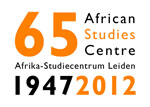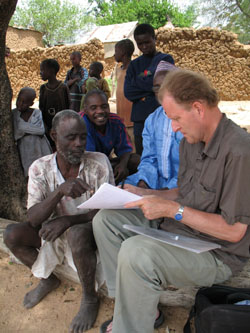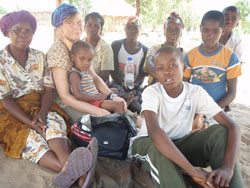The ASCL’s Research Programme 2012-2018
This is the former Research Programme (2012-2018). Read the new Research Programme (2019-2024).
Introduction: Africa and Global Restructuring
 Since it was founded some 70 years ago, the African Studies Centre Leiden (ASCL) has become one of the world’s leading centres for the study and dissemination of knowledge about Africa. Its academic research, which is primarily in the social sciences and the humanities, has a strong empirical base and is also attentive to policy debates. The ASCL has an extensive library and documentation centre with one of the best Africana collections in Europe. The Centre has close contacts with colleagues in global and area studies in Leiden and the Netherlands, with Africanists in the Netherlands and Europe (through AEGIS, the African Studies in Europe group) and with colleagues in Africa (through CODESRIA and other networks), Asia and the Americas.
Since it was founded some 70 years ago, the African Studies Centre Leiden (ASCL) has become one of the world’s leading centres for the study and dissemination of knowledge about Africa. Its academic research, which is primarily in the social sciences and the humanities, has a strong empirical base and is also attentive to policy debates. The ASCL has an extensive library and documentation centre with one of the best Africana collections in Europe. The Centre has close contacts with colleagues in global and area studies in Leiden and the Netherlands, with Africanists in the Netherlands and Europe (through AEGIS, the African Studies in Europe group) and with colleagues in Africa (through CODESRIA and other networks), Asia and the Americas.
 Research programme
Research programme
The ASCL’s current research programme aims to understand Africa better within the recent historical juncture of global restructuring. The proliferation of new economic, political and cultural alliances since the 1990s, the recent economic crisis in North America and Europe and the emergence of new global powers are indications of a global restructuring in which Africa’s place is markedly different today from what it was just a decade ago. Within this rapidly changing global context, various countries in Africa have been experiencing relatively high rates of economic growth, even some countries without oil or mineral wealth. There has been increased demand for African resources, most notably oil, minerals and land, shifting patterns of trade and exchange, as well as considerable discussion about new investment opportunities in Africa and the continent’s ties with partners in Asia and Latin America. Africa’s rapidly growing population is increasingly youthful and urban, and many Africans are benefiting from improved health and well-being. Other important trends include the rise of a sizeable middle class on the continent, Africa’s ongoing religious dynamism and cultural creativity, and the spread of new technologies, such as the mobile telephone and satellite television. The ASCL is attempting to understand this seemingly accelerated change in Africa in relation to earlier political economic configurations, shifting patterns of inequality, access to resources and forms of conflict.
The ASCL positions its research, educational programmes, documentation and outreach work within the larger context of Africa in a world of accelerated change. The ASCL’s research programme, which runs from 2012 to 2017, focuses on the following four major areas with flexible and shifting emphasis by its researchers and members of the broader ASCL Community:
- Resources and well-being
- Constellations of governance
- Identification and belonging in a media age
- Africa’s global connections
These four areas are interconnected. Africa’s position in global restructuring is closely linked to the demand for its resources, which has an impact on the material and immaterial aspects of well-being, as well as patterns of exclusion, inequality and poverty. Markets rather than states are nowadays seen as the major drivers of change and the shifts in power relations between state and non-state actors (local, national and transnational) require critical analysis. New constellations of governance are marked by contradictions and zones of conflict that have major implications for resource use, the sharing of Africa’s increased wealth and the well-being of all Africans. Processes of identification and modes of belonging are also being influenced by global restructuring, notably people’s hopes, plans and aspirations. At the same time, processes of identification and belonging are helping to shape political and economic changes as new alliances are being forged, which might also promote adversity and conflict. New information and communication technologies are increasingly important factors in these dynamics. For Africans in Africa and beyond, global restructuring now means connecting to a multitude of old and new players across the globe. And for Europe and Africanist scholars these developments pose new challenges, which the ASCL is taking up.
 In addition to its links with the wider academic community, the ASCL is in close contact with other major actors in the Netherlands, including policy makers, NGOs, the business community and others with an interest in Africa. The ASCL is contributing to knowledge production in the current focus areas of Dutch government policy, while still maintaining its academic independence and its own research agenda. The Centre acknowledges the demands and expectations of the Dutch ministries involved in funding knowledge about international/global/development matters. These demands concentrate on ten African focus countries (out of fifteen) and four focus themes (food security; water; sexual and reproductive health and rights; and security and the rule of law) and nine top priorities for the Dutch knowledge sector. Of these, agro-food, horticulture, water, life sciences and health, creative industries, energy and logistics are particularly relevant for the ASCL. The cross-cutting themes of the Ministry of Foreign Affairs (governance; gender; the environment; and private-sector development) are all included in the research, training and documentation work of the ASCL. Special emphasis is placed on issues of governance.
In addition to its links with the wider academic community, the ASCL is in close contact with other major actors in the Netherlands, including policy makers, NGOs, the business community and others with an interest in Africa. The ASCL is contributing to knowledge production in the current focus areas of Dutch government policy, while still maintaining its academic independence and its own research agenda. The Centre acknowledges the demands and expectations of the Dutch ministries involved in funding knowledge about international/global/development matters. These demands concentrate on ten African focus countries (out of fifteen) and four focus themes (food security; water; sexual and reproductive health and rights; and security and the rule of law) and nine top priorities for the Dutch knowledge sector. Of these, agro-food, horticulture, water, life sciences and health, creative industries, energy and logistics are particularly relevant for the ASCL. The cross-cutting themes of the Ministry of Foreign Affairs (governance; gender; the environment; and private-sector development) are all included in the research, training and documentation work of the ASCL. Special emphasis is placed on issues of governance.

